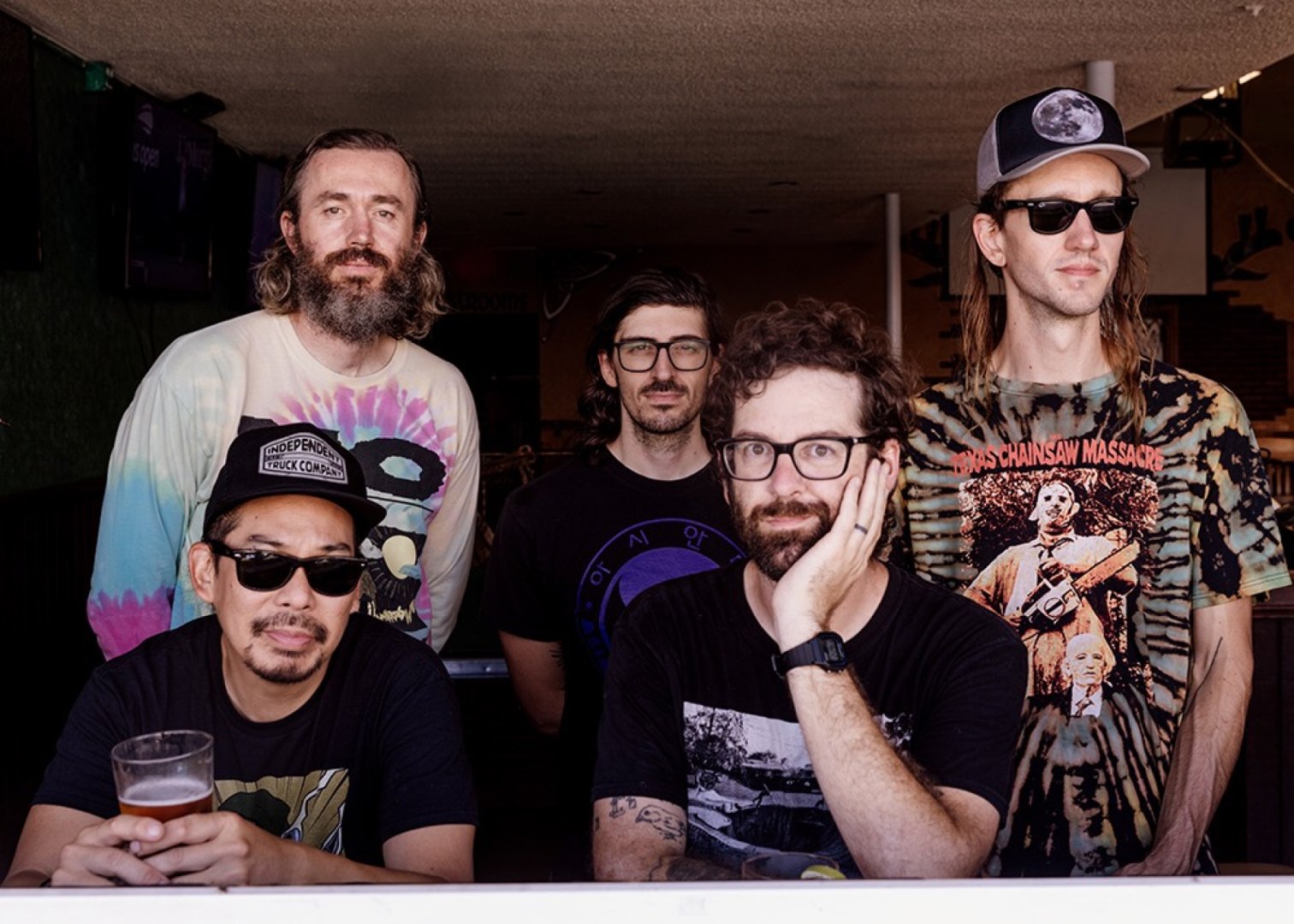Ever since Sean Bonnette and Ben Gallaty formed AJJ back in 2004, it’s felt like the world has been playing catch-up. That’s because the band—completed these days by guitarist/keyboard player Preston Bryant, cellist Mark Glick and (relatively) new drummer Kevin Higuchi—has always woven apocalyptic themes and imagery into many of its songs and lyrics. They even self-released a record called Good Luck Everybody in January 2020, as if they knew what was coming. Now though, in 2023, with their eighth studio record and debut on Hopeless Records, Disposable Everything, it feels like the world is finally aligned with AJJ’s doom-laden prophecies – albeit one that still shimmers with hope.
For singer Sean Bonnette, the record is less a prophesizing mirror held to a burning world than one inspired by personal grief. In fact, for him, this record is about what happens after the collapse—on both an intimately personal level and a much broader scale. “A large part of Disposable Everything is the terrible thing I’ve been imagining finally happened,” he explains. “A big theme is my mom’s death, which is something I think everyone lives in terror of. But once it happens and you’re still alive, you figure out how to move on. It is, in some weird way, our happiest record.”
Anybody familiar with the band knows that juxtaposition—between apocalyptic despair and the warm comfort of an electric blanket—is nothing new for AJJ, but these 14 tracks are the most firm example of that to date. Recorded with David Jerkovich over the first half of 2022 in various studios across the Southwest, Disposable Everything truly captures the simultaneous terror and wonder of being alive. Throughout the nearly 20 years since the band’s inception, AJJ’s music has always found its way to the irreverent, optimistic pessimists of the world. For example, 2020’s “Body Terror Song” became a viral hit on TikTok, an app that no one in the band was even on at the time.
Their unparalleled live show has always been the bedrock of AJJ, with memorable tours with Joyce Manor, Against Me!, ROAR, Jeff Rosenstock, Kimya Dawson, and huge indie punk festivals, like The Fest. And it’s that live energy and sense of community and collaboration that made its mark on the recording of Disposable Everything. For the first time recording as a full five-piece, the goal was to have fun, open up a free exchange of ideas, and just be together. That overriding sense of solidarity pervades this album, exaggerated by the way the band look at it more like a mixtape than a record in the traditional sense–fully indulging AJJ’s wide musical range and their tendency to play with genre, while also defying expectations as to what songs about certain subjects should sound like. Indeed, this feels more like a band record than AJJ have ever made before. Probably because it is.
It kicks off with “Strawberry (Probably)”, an uproarious blast of fast, glorious, carefree quasi-punk that descends into a warped blur of dissonance. That that leads into a song called “Dissonance” was, Bonnette says, unintentional, but nevertheless highlights the synergy that flows through these songs. Then take “Death Machine”, for instance – the song distills the current environmental and political crises propelled by a capitalist society into one minute 53 seconds of jittery, feel-good, punk rock urgency, in only the way that AJJ can do. “The Baby Panda” – despite spitting a horrific truth about what humankind has done to the planet, is an enjoyable singalong anthem. And the title track “Disposable Everything” spells out the damaging impact of late capitalism while still shimmering with hope. There are moments of pure levity, too—in the humor of “White Ghosts”, the self-aware wordplay of “Schadenfreude” and the offbeat romanticism of “Candles of Love”. Combined, it all offers a quintessentially AJJ-esque vision of the world, which Bonnette, both jokingly and seriously, refers to as like “The Beatles on bath salts.” As the lilting “In The Valley” brings the record to an end, it defies—save for one ominous moment—the reality of the present moment, transforming its chasm of nothingness into something resplendent. It’s a powerful final statement that renders Disposable Everything anything but. Rather, it’s a vital, important and beautiful album that’ll make you feel better about everything while telling you just how terrible everything is.
Bonnette has a simple explanation for that paradox. “And maybe where some sort of hope can be is within love, because no matter how fucked the world can get, people can love each other still.” That AJJ are still able to offer up their unique brand of humor and irreverence as a solution to the world’s ills almost two decades into their career isn’t lost on them, either. “I didn’t ever expect AJJ to be what it’s become,” says Gallaty, “but I’m really happy with it. Some of my favorite people play in the band, and the whole larger community we get to be part of just blows my mind. It’s honestly hard to imagine a life without it.”



